ArtNotAds #1: A Conversation with Musician Jairus Mozee
43 minute readThis conversation is part of our ArtNotAds Series. The work of artists featured in this series will appear throughout our website in the spaces where you’d typically see advertisements on other sites.
Born in Indianapolis, Jairus Mozee was 10 years old when he relocated with his family to Long Beach, his mother’s hometown. During his senior year at Poly High School, after garnering the attention of an older musician at his family’s church, Mozee, a virtuoso guitarist, was offered the amazing opportunity to play in the late legend Prince’s LA house band. It was a surreal five months for the teenager. For the past decade and a half since, J. Mo, as he is commonly called, has continued to work with a range of big names in the music industry, including Janet Jackson and Lil Wayne.
Recently, he helped bring home back-to-back Grammy awards; he produced “Come Home” with Anderson .Paak (featuring Andre 3000 from Outkast), which won Best R&B Performance in 2020, as well as the song “Anything For You” with veteran songstress Ledisi, which won Best Traditional R&B Performance at this year’s virtual ceremony.
Along with creating guitar-based sample packs called Swag Samples, which have been shouted out via social media by the likes of DJ Jazzy Jeff, J. Mo has been staying busy honing his craft as a multi-instrumentalist. Spending the isolation of the pandemic finding inspiration in the world around him, such as the tide pools on the other side of the Vincent Thomas Bridge, he has been focusing more on his own solo music.
Inspired by his new project, aptly titled San Pedro, FORTHE Curator Brandie Davison (founder of local collective ART REALM) shared a captivating conversation with the multi-talented artist and producer, which has been lightly edited for clarity.
Brandie Davison: Okay, just a heads up, in all transparency when I met you and saw you at Que Sera, that was my first time hearing your music and I automatically just thought, “Oh he’s dope!” and then I saw you play with your band after that and you guys were really good also. I have been following you on social media ever since and saw you post your recent project San Pedro and decided to give it a listen. I swear, I’ve been listening to the same playlist while I’m doing work or tasks and needed to hear something new. It was just what I needed. I listened to it repeatedly throughout the entire night and that inspired me to sit and talk with you further.
So I read that your mom is from Long Beach, right?
Jairus Mozee: Yeah.
BD: So if your mom is from Long Beach, do you know anything about her experience in Long Beach, or how your mom and dad met? Because he plays guitar as well, right?
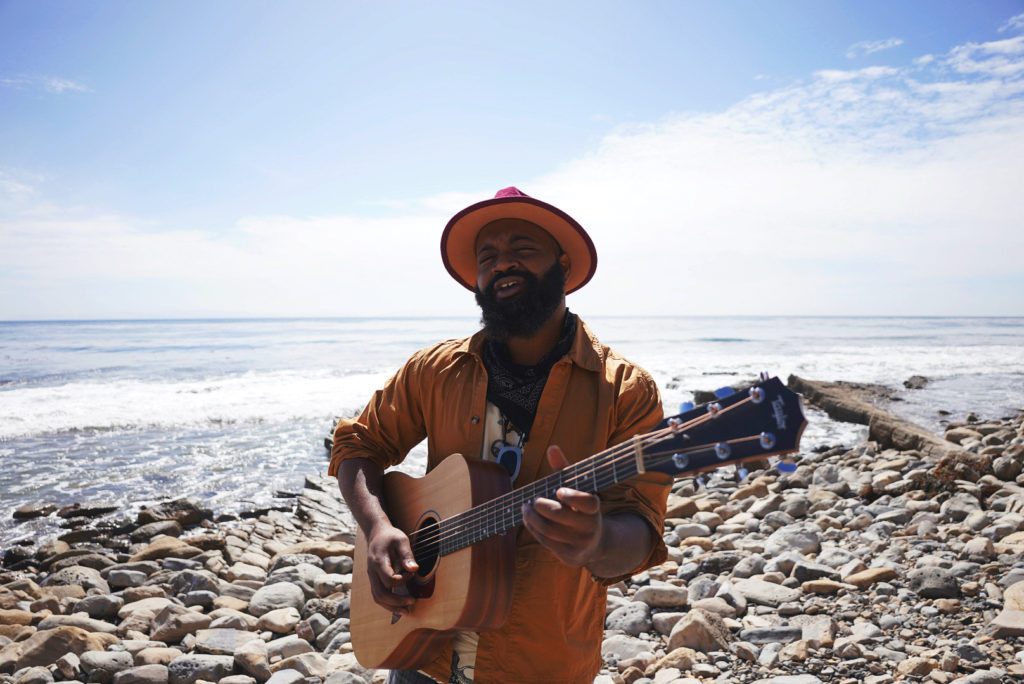
JM: So my dad is a guitarist. He was born in Philadelphia. His mother had like nine kids or something like that. It was crazy. And she died when my dad was like 15 or 14. So the church that we belong to, we’re all from this church called Church of the Living God. It’s an organization kind of like COGIC, or whatever, Church of God in Christ, same thing, but it’s like guitars instead of keyboards. So long story short, my whole family comes from this church. When my dad’s mom died, my dad pretty much was like a child prodigy on guitar already. So the organization pretty much adopted him and the head leader of the church was taking him on the road traveling to play for all the services when they would set up new churches. My dad was the main musician when he was like, 15 or 16. So I come from a long line of guitar players. And then my dad met my mom in California traveling with the church. My mom’s side of the family is a part of the church as well. My great-grandfather actually built the church that’s in Los Angeles right now. So my family’s like real deep in this church. This specific church.
BD: Was your family open to you playing secular music since you grew up in the church? Because I hear that often can be a problem.
JM: My dad kinda, you know, still to this day he’s not fully like, oh, man, excited about it, but they support me. At first it really wasn’t like that at all because they’re really strict; but eventually, as I got older and matured, my music matured, and it’s starting to make more sense; what’s coming across, what I want to say in my life. I was kind of finding my way up until these past two or three albums. Now I know the direction of my message that I want to put out versus just doing random-ass music. That’s what I was doing before. So now, my family can pretty much be more accepting of me and my music.
BD: That makes a lot of sense. I definitely hear that a lot from other friends who make music growing up in the church, and how that comes across and how you have to make that decision at some point to follow your own path.
JM: It’s basically deciding to live with no regrets.
BD: Did you like playing music when you first started playing for the church? Or was it something that your family more so pushed you into, and then you started enjoying it?
JM: They didn’t—they never pushed me. It was always around me though. And the thing about it is, these musicians that I was around are very exceptional. When I grew up, and I didn’t know that growing up, like, they were very good, if you were to rank them in the world. So I’m like, I’m thinking it’s normal, you know, the stuff that I’m hearing, the licks that I’m hearing, this and that. All my childhood, I never really wanted to do music at all. I was just into sports, regular boy stuff. But then once I got to California, we moved away from my dad, so I was like, missing that. I think I was just missing that frequency. Nobody was really playing what I heard in my head and what I would hear when my dad was playing, so I started just picking around and playing with it. Teaching myself really. That’s when I really started getting into it. I was probably like, around 10 or 11.
FROM CHURCH TO PRINCE
BD: How did you evolve from just playing in the church? What was the next transition for you? Because all I read after that was Prince. It went from church to Prince. When you met me you should have just said, “I’ve played with Prince.” That’s all the introduction that’s ever needed.
(Both laugh)
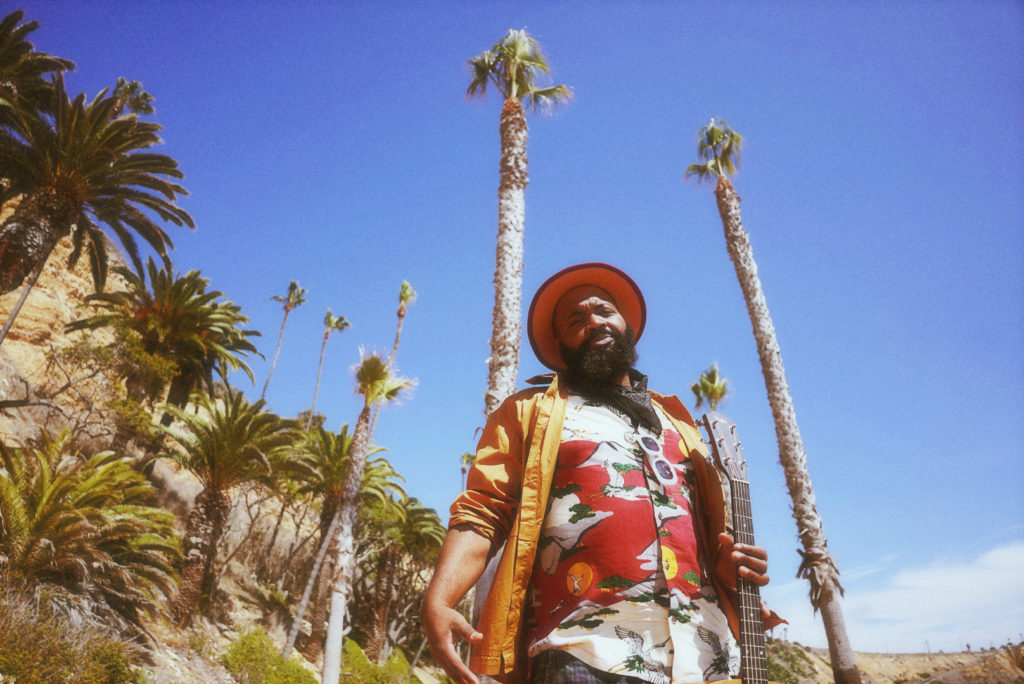
JM: I’m low key, I’m humble, you know? But basically, I was playing in church, like I said, but at the same time I was going to a school in Long Beach called Bancroft Middle School. So I was going to Bancroft and I had this teacher named Kim Holland, shout out to her. They put me in like this orchestra, but I was not trying to do that at the time. I was really into drawing and art, so I wanted to get into art class. But by the time we moved to LA, it was too late. So they put me in an orchestra. So mind you, I’m like, I come from a music family, but I’m trying to get away from music but it keeps coming back towards me. So Miss Holland, she saw me immediately and she recognized that I could play bass or whatever easily. And she put me on an upright bass. So I was in orchestra for like seven years in Bancroft and then I went to Poly and I was playing upright bass in the orchestra. I was the only Black kid at the time. Then I did jazz band so that’s when I learned theory and all that. So I put that with the church playing. Long story short, I had picked up a couple friends along the way in the church scene and one of my friends was playing in a band called Fourth Avenue Jones. They were having a rehearsal and we went to the rehearsal together. Their guitarist in that band was doing like, gigs with all types of people, you know, I’m saying Sheila E, B2K, this person, that person, right? So, after the rehearsal, we started jamming. Mind you, I’m like, 15, and I’m kind of keeping up with them a little bit. At least my friend, he thought so. I didn’t think so in my head. So after that, he’s like, “Man, you really sound good. I need some people to fill in for me on some of these gigs I’m doing.” So that’s pretty much what happened. His name was Tim Stewart. I got to shout him out. He was the one that kind of just put me in the industry. So he started me out. I was doing studio sessions with B2K. They had a bunch of houses in Diamond Bar at the time. I did two or three sessions up there and I ended up getting on one song. I remember my first check was like $800. I was in eighth grade, ninth grade. Yeah, I was on from that point. But pretty much Tim just started putting me on different stuff. So eventually, like a year went by, or something, and then he was like, “Man, I gotta go on the road with Sheila E but Prince is doing these house parties and stuff and he needs somebody to play in the band but they need to audition.” I was like, “Oh shit, whatever.” I wasn’t driving at the time. He took me up there. You know shout out to Tim. That’s the big move. He took me to the audition too. I ended up getting it. So they turned the tape player on. And they were just like, you know, jam. I just, I saw Tim play it and I just copied Tim and did my thing with it. And they said, “You’re hired!”
“So they were sending cars and sometimes limos and picking me up from school. I was going to Poly and they were picking me up every day from school just to go to rehearsal. When I was 17, my whole senior year was playing guitar for Prince.”
Jairus Mozee
BD: Were you nervous at that moment?
JM: To be honest with you, I wasn’t because I felt like it was so surreal. It’s like a dream. You know what I mean? It was literally like, I was just living in a dream. And I didn’t think I was gonna get it. Even at that age, I still was kind of fearless as well. I was always fearless from that standpoint. Like, I know I can do it. I’ve always had it in the back of my head. But I always put stuff down too, like, I ain’t gonna do it, you know? But I end up getting it. So they call me the next day. And they were like, “Yeah, we’re gonna start sending cars to pick you up.” So they were sending cars and sometimes limos and picking me up from school. I was going to Poly and they were picking me up every day from school just to go to rehearsal. When I was 17, my whole senior year was playing guitar for Prince.
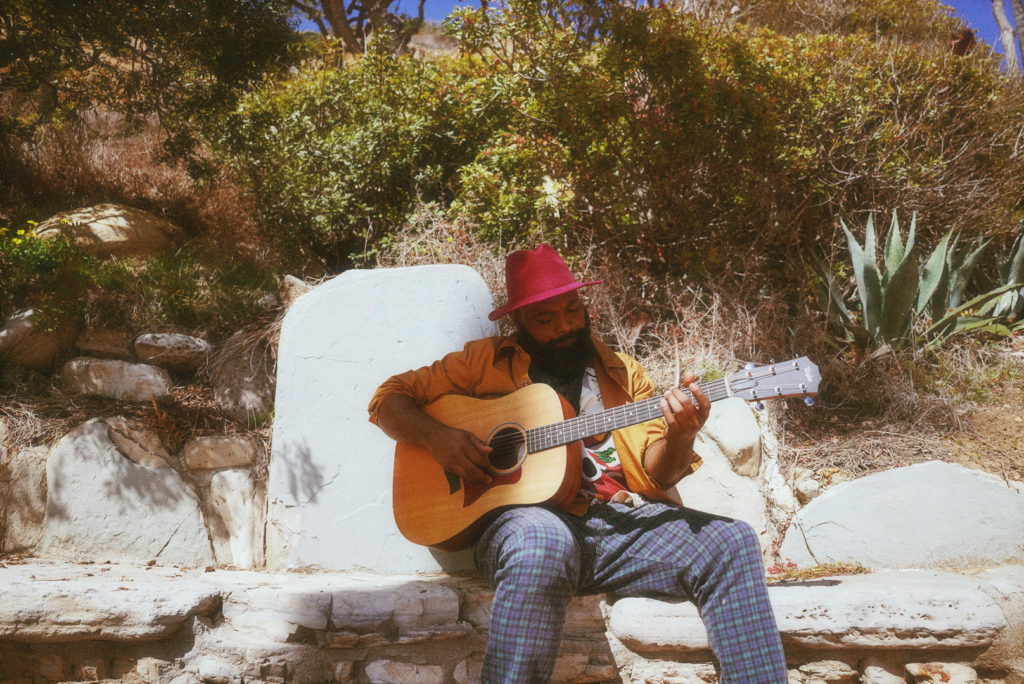
BD: That’s amazing. That’s much better than my senior year at Poly. How do you think that experience playing with Prince shaped who you are now and even while it was happening in that moment?
JM: Um honestly, it gave me this backbone and I don’t get star-struck. So just imagine like being at parties with Prince, Angela Bassett, Questlove, Oprah. These people were sitting and having conversations with me and I’m only 17, so that kind of just broke the ice for me to see that celebrities are normal people. I can walk into any room and I can just know if you’re acting like an asshole, you’re just pretty much an asshole you know?
BD: Yeah, their mistreatment has nothing to do with “who they are” or their talent.
JM: Yeah. You’re just a bad person in general. Because I have met celebrities that are just so cool, down to earth.
BD: Yeah, that’s a huge thing. And I think especially as a Black person, specifically as a Black man, I can imagine sometimes going into certain rooms, just in everyday life, it can feel uncomfortable. I feel like you being in those rooms at an early age gave you such a confidence boost. It’s like, “I belong here and I’m sitting with this level of people but they’re all just people at the end of the day.” Do you have a specific memory of that time or something that really stands out about your experience playing with them?
JM: I just remember times where they would call me randomly. Literally, the last time I saw him (Prince), they called me and it was like midnight or one in the morning and they wanted me to come play and I walked in and it was Larry Graham from Sly and the Family Stone—the bass player that invented slap bass is playing bass; John Blackwell, rest in peace, on the drums; Prince is playing the organ and they have a whole setup for me. I just remember the moment I saw Angela Bassett. That was like one of my favorite actors and/or actresses growing up, like damn, she’s over there just like dancing and having a good time. I did have a crazy moment with Oprah.
(He tells me the story but it has been removed, because… it’s Oprah.)
BD: No, dude, this sounds like a fucking Dave Chappelle skit, like damn, Oprah get up.
JM: That was one of the crazy moments. My moments rarely have to do with the music itself. It was just being around those people, all this time I put in as a kid, I knew as a kid, I’m like, I’m sacrificing a lot going out playing. I told my daughter the other day I didn’t go to the prom. We were passing by Antioch, but it used to be a club. I can’t remember the name of it.
BD: The Vault 350.
JM: The vault. Yes. We used to go there all the time when it was open, that was our favorite spot, right. So it ended up that my prom night was the same night that Mint Condition was coming to town. And that was my favorite band at the time. So I had to make a decision. I said, “Fuck it, I’m going to the Mint Condition concert, because my fucking career is showing me that I’m on music. I don’t have to do everything that all my homies are doing.” I always used to be like that. I’d rather do something to sacrifice for my career in the long run, then go and hang with the homies. So it all paid off in the long run for sure.
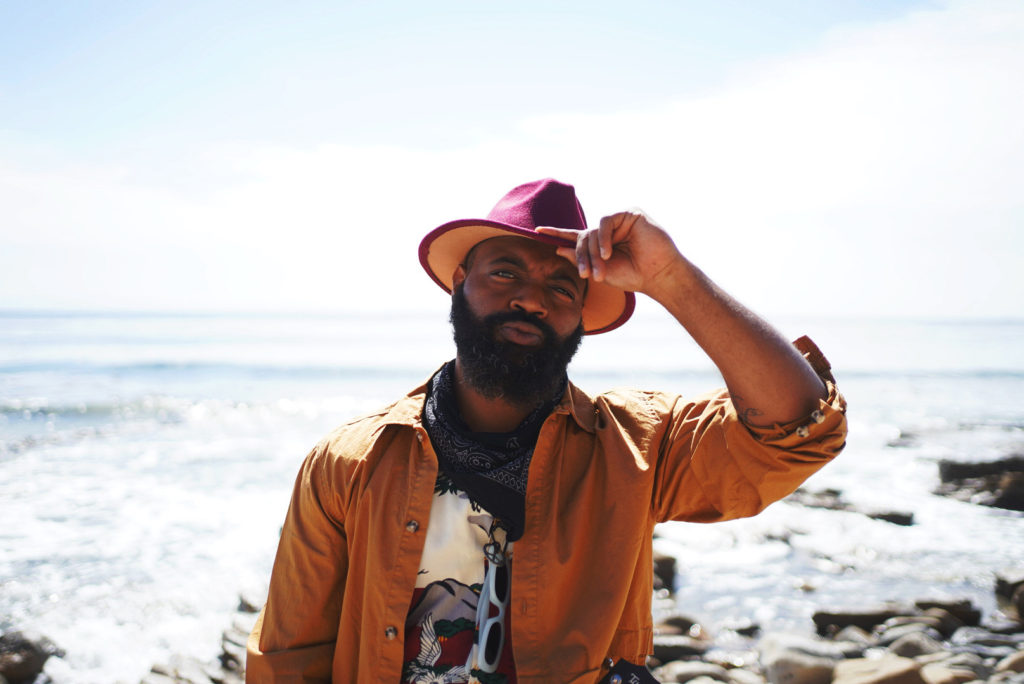
ON INSPIRATIONS AND MAKING MUSIC WITH ANDERSON .PAAK
BD: Yeah it obviously did pay off. How did you get that mindset of “I want to focus on my career and work.” Were you just naturally like that?
JM: See, to me it’s not work. It’s so fun and it’s easy for me. Because, like I said, my family is so natural with it. And if it’s not easy for me or fun, I don’t do it. I just make my work fun. That’s pretty much it.
BD: Have you ever felt nervous, pressured, or uninspired to make music?
JM: Definitely. Definitely felt nervous. I feel nervous every now and then. Last time I felt nervous we were in Africa. I was playing guitar for Raphael Saadiq. And that’s like one of my idols. That was the first time I felt that in a long time because I hadn’t done a show with him yet. We did a rehearsal. I know all his music. But for some reason when I saw that crowd when he was about to hit the stage, something just hit my heart and I’m like, “Aww I’m finally about to play with this dude.” But other than that, you know, I really don’t get nervous anymore. I just try to have fun. If it’s not an atmosphere where I know that I’m not gonna have fun, I just try not to be there, you know? Yeah, and I’ve had experiences where I was on gigs where just the vibes wasn’t all the way right and I would still hang on to it. It just takes all of your energy so I’ve learned to just say no to certain things.
BD: I think that applies to a lot of things in life, sometimes we just try to hold onto things because it feels familiar until you realize it’s actually taking so much from you—situations, friendships, too. So you’ve already mentioned your admiration for Rafael Saadiq, who else are some of your biggest influences?
JM: Definitely D’Angelo is one of my biggest influences. Like, for my sound personally, D’Angelo, my dad, my family. You see, there’s a guy that’s from our church, he’s a country artist now, his name is Curt Chambers. So when I was young, he was like, one of the first guys I ever saw in our church that played outside of our church. So there’s a whole video, I’ll send you a clip or something just so you can see it. It’s a video of us playing, him playing for Eminem on one side of the stage, and me playing for Lil Wayne on the other side of the stage with the same guitar. It’s like this big moment for our families. We’re the ones out of our church that made it out. But all the greats you know, the Jimi Hendrix’s, you know, the B.B. King’s, everybody, you know, everybody that’s good.
BD: Love for everybody that’s talented, I can respect that.
JM: Oh, I gotta say this one guy, if you want to put it in there, this guy, Ju Smith. His name is Jubu. He’s crazy. I got to throw him in there.
BD: Where’s he from?
JM: He’s from Oakland. Yeah, he’s the guitarist from Tony! Toni! Toné! So all those classic licks and that’s part of my sound and my bread.
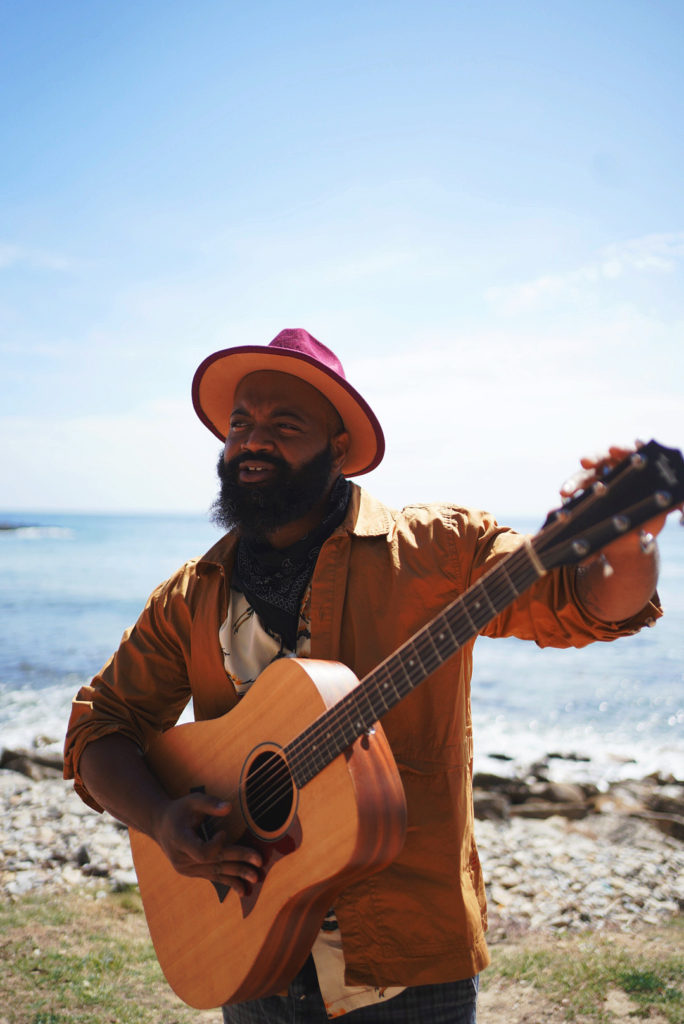
BD: That’s a worthy shout out for sure. So I guess in the spirit of manifestation, you’ve worked with so many people, is there anybody who you haven’t worked with who you’re like, “I have just got to do something with them”?
JM: I mean, D’Angelo’s probably the only one, like the one I really want to work with. If I can work with D’Angelo, I can probably be good.
Tomisin Oluwole
Fragmented Reflection I, 2021
Acrylic on canvas panel
24 x 30 inches
Click here to check out our interview with Tomisin Oluwole, a literary and visual artist based in Long Beach.
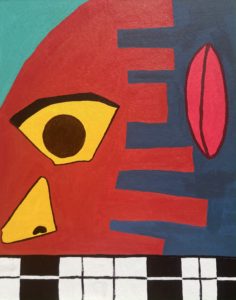
Instead of gunking up our site with ads, we use this space to display and promote the work of local artists.
BD: Great one, we have to make this happen. Do you have a favorite studio session or experience with artists that you’ve worked with?
JM: Ah, there are sessions that stand out in my head as you say that, so I could say one for sure. I was working with Anderson .Paak. He flew us out to Mexico, me and a couple of other people like the Free Nationals, and, you know, a couple of other people that were always down and around for the last two or three albums. We went down there and just had fun and did some music. That was great. And then we ended up going back again, with a smaller group. So this was like, probably one of my favorite sessions ever. Just because of the vibe. We came up with some crazy songs that y’all gonna hear like, a little bit later on, probably this year or next year. That’s like, crazy, crazy, phenomenal shit. Because of the vibes. Yeah. But that was probably like one of my favorite sessions while we were in Cabo.
BD: Okay nice. I can’t wait to hear some of the music. How did you meet Anderson .Paak?
JM: Ah, I met Anderson through Kelsey [González]. Kelsey is from Long Beach and a part of the Free Nationals.
THE LONG BEACH MUSIC SCENE
BD: How do you feel about Long Beach in general as far as the music scene here? Just you mentioning Kelsey and us mentioning Que Sera, it’s a tight community. And how do you feel about that from a musician’s standpoint? Because although I am more familiar with a visual artist’s point of view, music and visual art connect culturally of course, but the interactions and perspectives may be a little different.
JM: Now Long Beach, the scene is awesome. You know, it’s really eclectic. You’re gonna get something different here. That’s what I like about Long Beach. It’s not like everywhere else. Nobody really puts you in a box. You can be whatever you want. I mean, if you want to try this, I’m trying this type of music and people will be with it. They’re not going to be like, “We want the old you.” They’ll get whatever you are doing, they’ll follow you. They are real fans of real music. The people around here are awesome, the creatives, the teachers are awesome. Long Beach is one of a kind. I tell people, man, if you want to get a real feel of a city, kind of like the, you know, away from the Hollywood scene, come to Long Beach.
BD: I feel the same! When I lived in Atlanta, a lot of people kept saying, “Oh, I want to go to California,” and they would always say LA. I would always tell them the same thing. Like, you want to visit Long Beach. It has a big city vibe, but I feel like people are just a little more down to earth. You can make real connections and real relationships. So I guess we have a sound, but because I’m still around it so much I sometimes don’t realize. And I’ve always been around it and able to witness it evolve. How do you feel about the Southern California sound? Some examples would be like Anderson .Paak or like Kamasi Washington or Thundercat, like that real SoCal sound? How do you feel about it? And the musicians that are coming out of here right now?
JM: It’s the same. Like, overall LA, that scene is, you know, it’s just dope, and the world is following behind it so that’s all I could say about it. I’ve been knowing Kamasi since back when he was playing, I can’t remember the name of that church, but he was playing at a church in Compton. At my cousin’s church, and his pops used to play too. I mean, they are really rich LA history. Thundercat, I call him Steven, Steve, but I’ve been knowing him since I was 15, 16, playing around LA, so it’s just good to see, you know, everybody just doing they shit. Yeah, I’m just happy and excited for everyone.
TEACHING AND SCHOOLING
BD: Is it true that you gave guitar lessons to Steve Lacy?
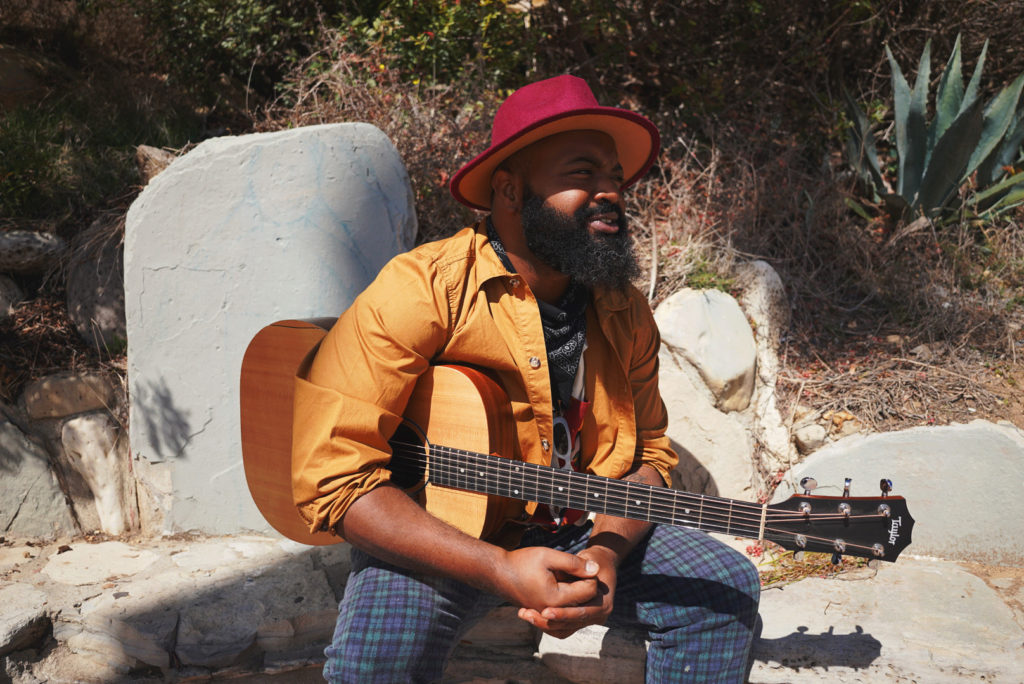
JM: Yeah, yeah. That’s literally the only person. His mother, she’s like, “You have to teach my son.” Well, I was going to the same church as them and at the time he’s probably like nine or 10. So like, after church, even during the service, I would notice him just watching me, just staring at me, and it reminded me of myself because I was like, “Oh, he really liked it.” Because a lot of kids, you notice if you go to a church, they’ll try to just immediately hop on an instrument. They’re not going to watch it and study it. They’ll just want to get on it. So I noticed that about him, like he’s actually studying what I’m doing. He’s watching me. So after service his mom came up, she was like, “Yo, can you just please teach my son? He really wants to learn from you.” And I just buckled down and said yeah. I was literally telling somebody that today like, I don’t like teaching, I just, you know, I’m not that type of person. I love the satisfaction that it brings. I just feel like it’s later for me in life to sit down and say, “I’m going to be a teacher.” I have a lot more I got to give. But that was a special thing to show me that when I do sit down it’s going to spread like wildfire because that was the only person I literally taught and you see what he turned into. So yeah, I taught him for about a year.
BD: I can’t even imagine if you hadn’t have done that. That would’ve definitely changed the ripple effects in the universe. Your band, The Truth, how did you guys form?
JM: Well, Dae Dae (David “Dae Dae” Haddon), the drummer, I’ve been knowing him for some years. I met him playing with Redman. I met Eric (Ingram) while we were playing with Lil Wayne for a few years. So it’s just like three guys that were background musicians came together. We were at my crib one day, I think it was just one of those days we were just smoking, doing some beats. And I just came up with this idea I was like, bass, drums, guitar; something just clicked in my head, I was like, “It’d be dope if we did like Jimi Hendrix-type shit.” Nobody really doing that shit right now, or whatever. But yeah, we ended up doing our first song that day and then we just kept going.
BD: I’ve been to a lot of shows, I’ve seen a lot of bands. You guys are interesting to watch. Like, not just to listen to. I don’t know how to describe it perfectly but you guys set an atmosphere. I don’t know if it’s just natural energy. Of course, it’s the music. But it’s nice to simply watch you guys. Where did all these performance skills come from? Like, when you’re putting the guitar behind your back and playing? Where did that come from? When did you start doing this?
JM: Literally, since I was a kid. I remember Poly used to do concerts and stuff. And I remember the first concert I ever played with my teeth in front of like all the kids and I remember playing and singing at the same time. Growing up at Long Beach Poly, I think that was what gave me my open mind to music. To try different things. You know what I mean. (He smiles off into the distance, remembering good times). So I forgot what was the question you asked though?
BD: I was just asking where your showmanship came from?
JM: It’s definitely that a lot of it comes from Long Beach Poly, and shout out to Dustin Moore. Me and Dustin was like a tag team back in the days, Dustin [AKA] Neon Phoenix. So shit, man, I just, I’m getting like, good memories from that. Yeah, nostalgia. Me and Dustin used to do so much together. Just concerts here and there. We used to be at his mom’s house and shout out to his mom, rest in peace. She used to have us over there rehearsing. She was like a real Prince fanatic. She was from Minnesota so she was a part of that scene. That’s why Dustin is like how he is because his mom. His mother was like this all-around amazing person, man. She poured a lot of energy into us. Like after school, she would let us rehearse and stuff like that. I remember specifically, she used to always tell us to just fly, have fun. Don’t let anybody hold you back. Try different stuff.
BD: That’s amazing. And it’s so needed. And I can’t even imagine being a parent, because that takes energy in and of itself, and on top of that going that extra mile not just for your children, but for other kids that are around. That’s real community. Poly is definitely the best high school in Long Beach.
JM: Sure is. One of the best schools you can ever find, period. Yeah. I’m like, just amazed. It’s something you can’t explain. You got to experience it because there’s so many different people that you meet and it just prepares you for the world. That’s why so many dope people come out of there.
BD: Definitely. I think about that often. I feel like it’s an honor that I’ve gotten to experience this. It’s a special thing.
JM: Yeah, it definitely is.
‘I WANT MY MUSIC TO KEEP SPREADING AFTER I DIE’
BD: You have Grammys, and I wanted to know, did you ever think you would get to that point? And what did it feel like, that moment of winning?
JM: You wanna know what’s crazy. So when I get to knock stuff out, I’ll be like, “Okay, yeah we on to the next thing.” That’s how I think in my head. I was playing with Prince at 17. So I could have probably given up after that. A lot of people would have probably kinda been like, that would’ve been their life’s thing that they throw around all the time. I’m the type of person that just keeps stacking on accolades. I expect to just keep stacking things up. You know, even when I die, I want my music to keep spreading after I die, and it’s still going to be getting Grammys. So that’s how I view my music and my craft. When we won, what’s crazy is I was watching it, but I got kind of bored. I didn’t know if our session was coming up or not, so I hopped on the drums. And when I hop on drums, I just zone out, jam, go crazy. So, next thing you know, something just told me to look down while I was playing and all I see is Anderson accepting an award. I’m like, “I didn’t actually think we were gonna win.” Well, I was like, “What the fuck, we actually won!” It’s just one of those things that’s so surreal. Like I said about playing with Prince. It’s like a dream, you know? And then you just keep stacking on.
BD: How do you stay encouraged? What do you do that makes you want to keep going?
JM: Honestly, I just think about my legacy, I think about my daughter. I have a nine year old. So I think about her and her future. So I just go hard. My family does not come from a family of wealth or anything like that. So I always had to work for everything so that’s just how I am. I just want to be great. I want our family name to be cemented. I always felt in the back of my head, like my family never got our just due for music, you know, because we never stepped out and just pushed it in front of people. So I wanted to be that first person to really go 100% out and just put our name out to the world, not just to a small church or wherever, and just let my family know that our talent is amazing, and you can branch out and spread it to more people. So that’s always one of my influences, like, I gotta do this for my family. I’m an example for them and for other people as well, across the whole world.
BD: Yes, that is a beautiful thing. I wanted to talk about Swag Samples. It’s great for people who don’t play instruments because they receive live instrumentation for their music and they don’t have to get clearance from labels. How did you come up with that idea?
JM: Honestly, I had done a couple other sample packs with a few other companies that reached out. But I wasn’t seeing any kind of money from it and I was wondering why. So something just clicked in my brain one night, I was like, let me make a website and I think I put like 50 samples or whatever. I sold them for $25 and I woke up the next day, and I had like $300 or something in my account from just that. and I had only made maybe like $100 from these other companies. I’m like alright, let me just keep doing this. Right before this, I had done one of those things, you know, you write stuff down, your affirmations or whatever. So I wrote down I wanted to make $20,000 by Christmas. It was the beginning of November and lo and behold, I made $20,000 from just Swag Samples, selling those samples. All the money came directly to me and something told me to make an actual company and sell it. You know not just put it under Jairus Mozee. So now I have, you know, a couple of my other friends on the site like Charlie Bereal that have packs too. So we take a small percentage and then pay them, versus going through other companies.
BD: So you are the company now?
JM: Yeah, that’s what I want to get across to a lot of musicians too: start some companies. You don’t have to rely on these other big companies. It’s good to get your name out doing it like that, but it’s not really going to make any money. You have to make your own company, and cross-bridge and cross-promote your company with their company. So you’re getting fans and people from them, and you’re getting money coming in, but if you’re just promoting them, and you don’t have any product to sell, then what does that mean? You’re getting some free gear here and there. But come on, I just want everybody to grasp that as far as the musician community, let’s make some more companies. I’m always looking to improve the site too. I want to put that out there. If somebody wants to check the site out, you can help me upgrade by making suggestions, please hit me up.
GOING SOLO
BD: Okay. Okay. So I wanted to ask you also, how do you think the internet has impacted your artistry and your industry specifically, as a musician, for good or for worse?
JM: Um, as far as the bad, it oversaturated everything, so you’re not getting a filtered artist that’s developed from a label and that’s manufactured and super ready and crispy, you’re not gonna get that all the time. You have to sift through all these different artists and things and people to find, like, this gold magic that we would have found in the ’90s or ’80s just (snaps fingers) like that, because the labels would have filtered them out. But it does, in that sense, it makes it an open game for anybody to make it. So that’s the beauty of it. Even for my album, I didn’t have to go get a label or anything I just, you know, was like, “Fuck it. I’m gonna just put a project together and just put it out.”
BD: I understand. So your first solo project, “The Elevator Album,” what inspired you to do your own thing?
JM: I was always like that. At the time and still to this day, it’s like a stigma for like, um, I don’t want to say Black musicians, but like background musicians, for them to come out as artists, like, nobody really wants to fuck with their music. I always wanted to break that stigma and I just wanted to start early. And so I always knew it was a phase of you, having like, kind of good music and kind of good songs because songwriting is a whole journey that you have to go through to learn how to write songs. So I learned that early I was like, “Let me start writing songs early because that’s where the good albums come from.” I always just wanted to be an artist. I always felt like I knew too much and I was too gifted to just be in the back all the time. So I just said, “Fuck it. Let me start my journey early and get the kinks out.” So Elevator is, good to me, but then my second album after that, “[The] Garden,” is getting there. And then this last one is like my best work to me. So every one is going to keep getting better and then eventually one of them is going to pop. I’m going to be this big artist and I’m gonna prove everybody wrong. That you can’t be a background musician who comes out as an artist, that’s the stigma that needs to be broken. So I’m gonna be one of those people that breaks it.
SAN PEDRO
BD: Yeah you got this! And as long as you always come back and play at Que Sera, we’re good. When you make your solo projects, is this music you’ve already made? And you’re just compiling it? Or do you go in fresh and create from scratch specifically for each project?
JM: So everyone is kind of different. But yeah, a lot of them come from stuff that’s already made. Then some of them are like, you know, just fresh off the top. So this one, San Pedro, was all organic. So this last project was basically just me vibing because I moved back down to Long Beach. I was in LA for a long time. I moved back and I found myself just going across the bridge to San Pedro. And I never really explored over there and saw that land and stuff. You know, I wish I would have known when I was younger.
BD: The layout of it alone right? Beautiful.
JM: Yeah, it’s beautiful over there. Then you keep going around and you got Palos Verdes right there, I never knew that. So that was like my year of, you know, just exploring that area. So I was going over there, like, three, four, or five times a week, just going over to the beach. I got a little truck, so I just pop the truck open, just sit out there and just chill, you know, just catch a vibe. Then I would come back and do music just based off of that vibe and I wanted to do an album kind of dedicated to that area, that special land because there’s something special about pieces of land to me. That land brought out something in me that I could give to the world. So I just wanted to do a project dedicated to that because this whole pandemic, that was like what was getting me through. Just going over there and seeing life move and birds and natural things moving and occurring. Then when I learned about Sunken City, the part of the city that fell in the water, that just sparked my curiosity more. The land is talking and it’s moving. You know, there’s something special about that little spot, so I had to just do something for that.
BD: I definitely feel the vibe, I feel very similar about San Pedro. I used to go there a lot. When I was younger, my mom had a best friend who lived there. I used to be so afraid of driving over that bridge. But it always gave the feeling that you’re so close to home, but somewhere far enough away.
JM: Yeah, yeah. Yeah. I got pretty much sprung on that area. So anytime I feel like I want to get away, I’ll just go over there. It feels like I’m in Cabo or something. Like, once I go around to Palos Verdes. It’s like you’re in a whole ‘nother fucking place.
BD: Is there anything else that you think it’s important for people to know about this project?
JM: I would say just take it as you are getting in touch with nature, that’s what I will gift people from this project, the ability to tap more into nature and peace. Get away from distractions, cars, and stuff moving around and noise, and just go out into nature and just relax, get your mind together. You come back to the distractions, you got to go back, but get out of it for a little while, that’s what’s gonna help you get to a new level in life. To not be the same, or be stagnant, I think you got to find somewhere to get to peace, and nature for me is one of those places where I could find peace.

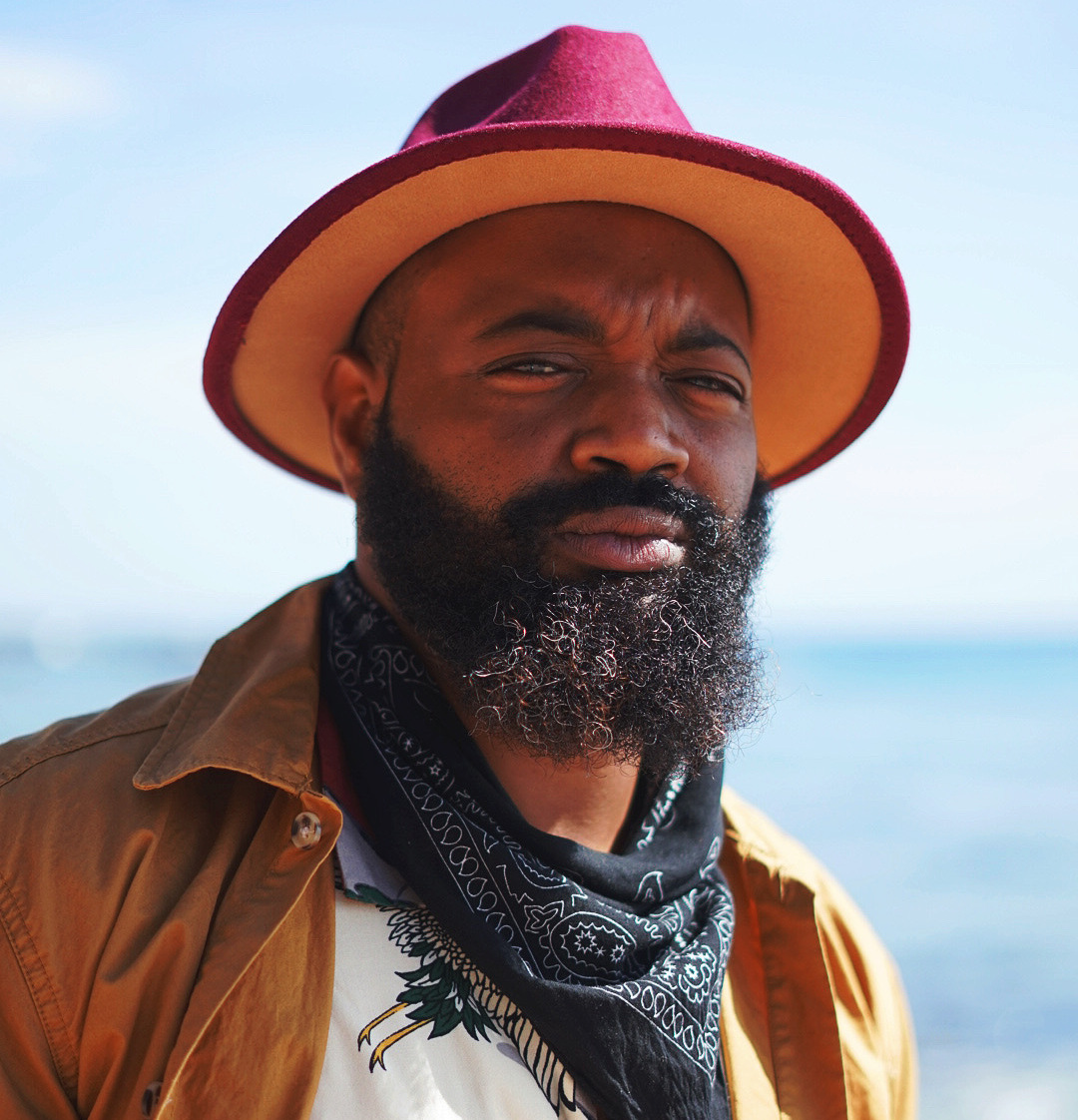
 davisonbrandie@gmail.com
davisonbrandie@gmail.com




